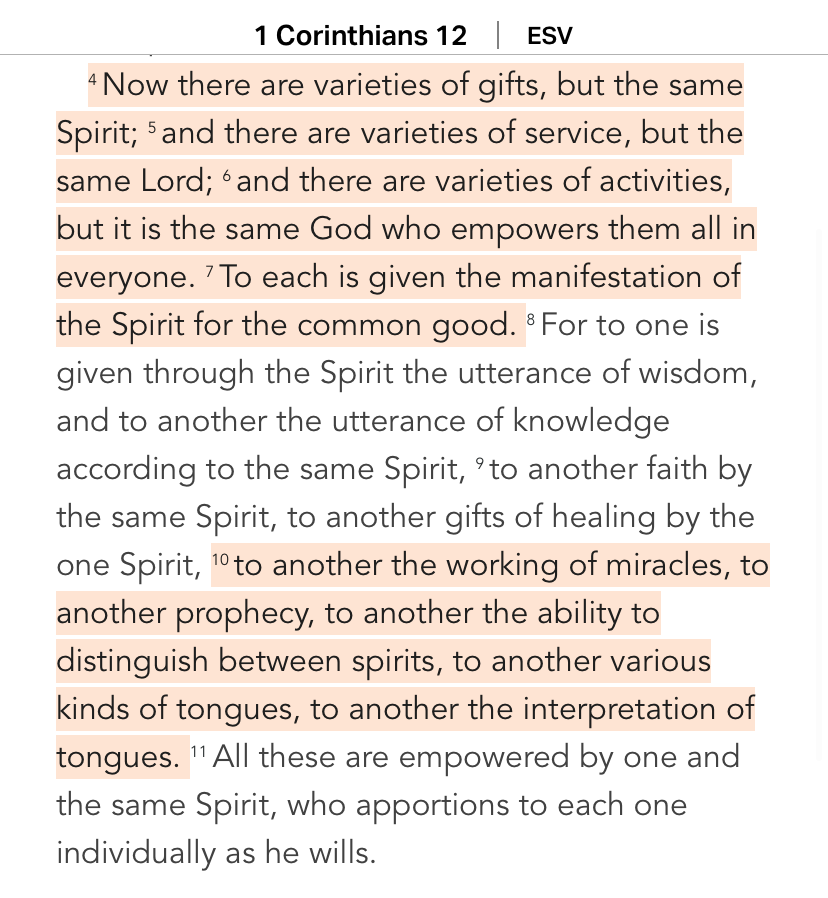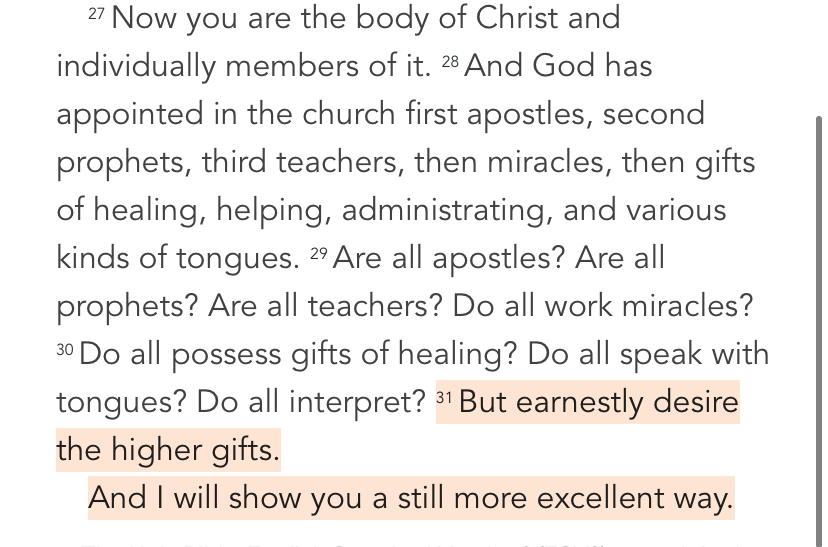On the Gift of Tongues, Pt. 1: The context of love
An exposition of 1 Corinthians 14
(Requested topic by a paying subscriber.)
Disclaimer: This post assumes that you understand and agree that “tongues” are actual foreign languages and not do not resemble the ecstatic speech found in many modern charismatic circles.
The gift of speaking in tongues has got to be one of the most widely abused concepts in scripture in the nominal church today. At least from my vantage point, it seems to have falsely converted more proselytes, scared more adults into leaving the faith after experiencing its misuse as children, and cast a shade of lunacy on the church in the minds of more outsiders than any other mishandling of scripture. The “do not judge” verse might be the only concept more abused than the practice of speaking in tongues.
If you recall from part 2 of my post Whore’s Glory, the most important rule for interpreting any biblical text is:
Context, context, context.
Deriving the rules for proper use of the gift of tongues, their purpose, and their status in the modern church is no exception. In fact, surrounding context is absolutely indispensable in this instance because taking chapter 14 on its own can land you with a potpourri of misapplications.
And beyond the immediate context, contemplating the subtext (i.e. how does the theme of tongues teach us about Christ and the gospel?) also helps dissuade from the human tendency to divorce an idea from the holistic message of scripture.
The context of chapters 12 & 13
Before going straight into chapter 14, we have to back up a couple chapters for some relevant context. This is a letter, after all, and chapter 14 was not meant to be read in isolation, or even as a chapter for that matter. We added those divisions later.
The Corinthians were very much a self-love culture and part of the reason Paul was writing to them was to call them to repent of their childish and self-glorifying thinking. They were practically in a mode of competing for the gifts of the Holy Spirit just for the sake of boasting in their own abilities.
The common good
Paul begins to address the topic if manifestations of the Spirit in chapter 12. Given the self-centered nature of Corinthian culture, the most important thing he points out (at least, in my opinion) is that ALL the gifts are bestowed by the same Spirit “for the common good.” The good of the church. This includes the gifts of various kinds of tongues.
At this point, I will risk a tangent.
“For the common good” leaves no room for the idea that the speaking of a tongue can or should be kept to oneself as a means of building oneself up. Yet many in the visible church claiming to have this gift would posit this self-edification as being the primary benefit they enjoy in the form of a private prayer language, though they likely would not phrase it that way. I have heard on several occasions that the reason for this privacy is because of fear of rejection by the church, especially in more reformed circles. I can understand that. However, if this gift resembles the tongues spoken in the early church and may be used within the biblical parameters (which we will get into in part 2), what is there to fear? (This isn’t to discourage—quite the opposite. If you truly have this gift, you are commanded to use it!)
I suspend my judgment for now, as there is more to unpack, but a question arises:
What other gift of the Spirit is ever spoken of this way? As something to build oneself up or to be used privately? None. The gifts are given for the common good of the church, for her sanctification and the spread of the gospel. And this is consistent with Paul’s intent to call a self-centered culture to repentance and into greater love for one another.
After giving an illustration of how the church is like one body with many different parts, again, all working together for the good of the whole (the ear doesn’t keep its hearing to itself, nor the eye its sight, nor the legs their mobility, etc.), Paul encourages them that, yes, they should desire the higher gifts.
BUT. Even with that desire, he has a more excellent mode of operation to show them than manifestations of the Spirit in the form of signs and wonders. What? Something of greater benefit to the body than miraculous gifts?!
The way of love
Right in the middle of beginning his exhortation on spiritual gifts, Paul takes a chapter-long detour on love. Again, admonishing the Corinthians on their tendency to be self-focused.
Hyperbole
Paul takes a hyperbolic tone with a handful of the gifts to highlight the importance of the two greatest commandments above being a master of miraculous manifestations.
“If I speak in tongues of angels…”
“If I have prophetic powers…”
“If I understand all mysteries and all knowledge…”
“If I have all faith…”
“If I give away all I have and deliver my body up to be burned…”
No doubt you’ve heard some say, “tongues of angels” implies the aforementioned “personal prayer language” used to edify oneself.
But look at how many gifts are exemplified here in a hyperbolic manner to make his point about the surpassing importance of love: No one understands all mysteries, has all faith, gives away all they have, etc.
Just as “if I understand all mysteries” (and no one does) is an exaggeration to imply the meaninglessness of the gift of knowledge if it is contained within oneself and devoid of love for God and one another, so “tongues of angels” is just another exaggeration to say that you could be so gifted in speaking foreign languages that you can speak a language not even of this world, and yet it means nothing if the end of this manifestation is to build yourself up.
And that is exactly what many twist this phrase to mean: the OPPOSITE of the point Paul is making about love and the common good of the body (ch. 12).
The two greatest commandments
Recall Jesus’ words in Matthew 22:36-40:
“‘Teacher, which is the greatest commandment in the Law?’ Jesus replied, ‘Love the Lord your God with all your heart and with all your soul and with all your mind. This is the first and greatest commandment. And the second is like it: Love your neighbor as yourself. All the Law and the Prophets hang on these two commandments.’”
Why are these two the greatest commandments? Because they embody the character of Christ.
“Greater love has no one than this, that someone lay down his life for his friends.” - John 15:13
Christ loved the Father perfectly but also demonstrated the second commandment perfectly in his sacrifice for us. And, thus, to be like him, we are to die to ourselves in favor of loving God and others.
This still applies when speaking of spiritual gifts, and the gift of tongues is no different. We all die to ourselves to become part of his body, to do good works for the common good of the church, and to love and regard one another as greater than ourselves. To use any spiritual gift as a means of self-edification is to act in opposition to the two greatest commandments.
I think of Christ. You could say he had all gifts, all good things from above. He was the gift, he was the good thing from above, and yet he kept nothing from us. He made himself a servant to the many.
“Have this mind among yourselves, which is yours in Christ Jesus,
who, though he was in the form of God, did not count equality with God a thing to be grasped, but emptied himself, by taking the form of a servant, being born in the likeness of men.” - Philippians 2:5-7
Paul gives his famous and eloquent description of love in chapter 13 and says it is the only thing that will remain forever.
He then, by comparison, addresses the childish thinking of the Corinthians as they seek to excel in lesser things with a selfish motive of being able to boast in how spiritual they are.
“To be seen by men”
Spiritual gifts, especially prophecy and tongues, are a very public way to see a person’s spirituality. Whereas love, it is quiet, sacrificial, often unnoticed because of its focus on others above self. It’s not something we often seek to excel in, hence Paul’s exhortation.
It’s as if Paul is saying, “Grow up! Be men!” Learn to die to yourself and love one another. The Corinthian reasoning was childish, competing for visible manifestations of the Spirit; but the mature Christian excels gently in love.
“He must increase, but I must decrease.” - John 3:30
The greatest of these
Whatever spiritual proclivity we bear, whatever good things bestowed from above, may we “do nothing from selfish ambition or conceit, but in humility count others more significant than [our]selves” (Phil. 2:3).
May we all strive to decrease quietly—as love always does.








Thank you for sharing! It totally makes sense that the tongues shouldn’t be used for self edification. But I’ve heard people say that since Paul says it’s for self edification, then it must be okay. The biggest argument that Pentecostals have is that when the Holy Spirit fell on the apostles they started speaking in tongues and then in another instant when the Holy Spirit fell upon the gentiles they started speaking in tongues and exalting God, so this must mean when you receive the Holy Spirit you must start speaking in tongues.